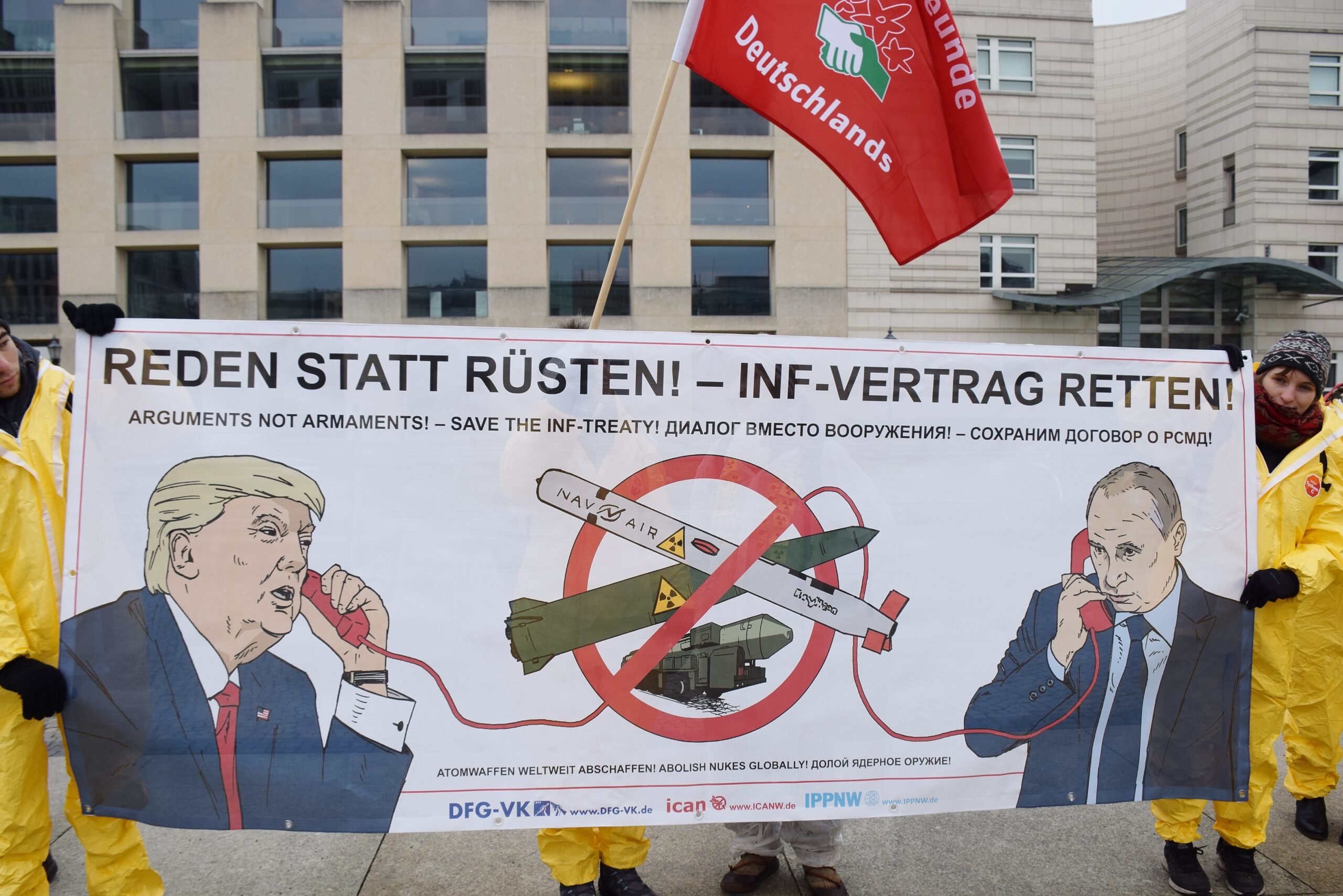Photo credit: Uwe Hiksch via flickr
Context:
The United States has announced their withdrawal from the Intermediate-Range Nuclear Forces (INF) treaty. Abandoning the treaty would make the world, especially Europe, less secure and mark another Cold-War-style arms race.
In the News:
The Intermediate-Range Nuclear Forces (INF) treaty was signed by U.S. President Ronald Reagan and Soviet Premier Mikhail Gorbachev in 1987. The treaty bans missiles with a range between 310 and 3420 miles and only applies to the U.S. and Russia and to land-based missles. Both countries can still have sea-based and air-launched missiles with this range.
“On October 20, 2018, President Trump announced at a campaign rally that the U.S. would pull out of the treaty. President Trump has said that Russia is violating the treaty. He has also complained that China is not bound by the treaty. U.S. officials are concerned about a Chinese arms build-up in the Pacific and want the option to counter it with their own intermediate-range missiles. The rationale seems to be that the U.S. is at a disadvantage by complying with the treaty when Russia is not and China does not have to.”
Russia is almost certainly violating the treaty. “In 2017, the U.S. said that Russia had deployed a cruise missile that violated the terms of the treaty. In earlier years, the Obama Administration accused Russia of developing and testing a missile that violated the treaty. The consistent message across administrations and over the course of several years suggests the U.S. has good evidence of the violation.”
“If the treaty no longer exists, then Russia can build and deploy intermediate range missiles without any limits. Missiles in the banned range are not a threat to the United States, but they do threaten U.S. Allies in Europe. The treaty provided a great deal of security to European partners. Without it, they are more vulnerable. President Trump has also said that the U.S. will begin building intermediate-range missiles if Russia and China do not agree to a deal. Congress would need to fund such a program, and it is not clear how realistic that scenario is. In Europe, Allies would need to agree to host the missiles on their territory. There could be stiff opposition in Europe to hosting U.S. intermediate-range missiles. Even so, this withdrawal raises fears of a Cold-War-style arms race—one we ended more than 30 years ago. The U.S. is already working on sea-based and air-launched missiles that don’t violate the treaty and that counter Russian capability. And, the U.S. could urge European Allies to join the diplomatic push to get Russia to modify it’s missile to a treaty-compliant range. In the end, if Russia is determined to cheat, there may be no saving this treaty. But, the U.S. has little to gain from being the first to withdraw. It will embolden Russia, threaten the security of our Allies, and it will not make the U.S. any safer.”
Insight from Peace Science:
From PSD Special Issue: Nuclear Weapons “The Importance Of Devaluing Nuclear Weapons“
Nuclear weapons are “social objects” that gain their value from the social context we create, therefore the value attached to them is subject to change.
- Nuclear abolition movements must include the devaluation of nuclear weapons if political elites are to be expected to voluntarily rid themselves of them.
- To devalue nuclear weapons we must shift to de-nuclearized conceptions of national identity and security, decrease the power and prestige associated with their possession, and challenge arguments about the effectiveness of nuclear deterrence
From PSD Volume 3, Issue 4 “Towards Global Abolition: Nuclear Weapon Free Zones and the Treaty on the Prohibition of Nuclear Weapons”
- Nuclear Weapon Free Zones (NWFZs) advance the movement against nuclear weapons by requiring commitments from countries to never use, test, or store their weapons within the NWFZ region.
- The unique characteristics, culture, and political environment specific to each NWFZ simplifies nuclear nonproliferation because countries within a NWFZ are better able to address regional nuclear threats—whether in the form of a neighboring country looking to develop nuclear weapons or in the case of an outside nuclear-armed state interested in testing or stationing its weapons within the region.
- NWFZs have been successful in creating a “nuclear taboo” that has changed international opinion and norms attributed to the role, legitimacy, and use of nuclear weapons.
- Current and future NWFZs can strengthen their treaties by making it mandatory for their members to sign and ratify the TPNW; specifically prohibiting external nuclear-armed countries from using, testing, researching, or storing nuclear weapons within their NWFZ; and including or strengthening provisions requiring victim assistance and/or environmental rehabilitation from past nuclear weapon users in the region.
References:
-
“Q&A: INF Treaty Withdrawal” By the Outrider Foundation. October 24, 2018.
-
Peace Science Digest, Special Issue Nuclear Weapons: “The Importance Of Devaluing Nuclear Weapons“; Vol. 3 Issue 4: “Towards Global Abolition: Nuclear Weapon Free Zones and the Treaty on the Prohibition of Nuclear Weapons”.

